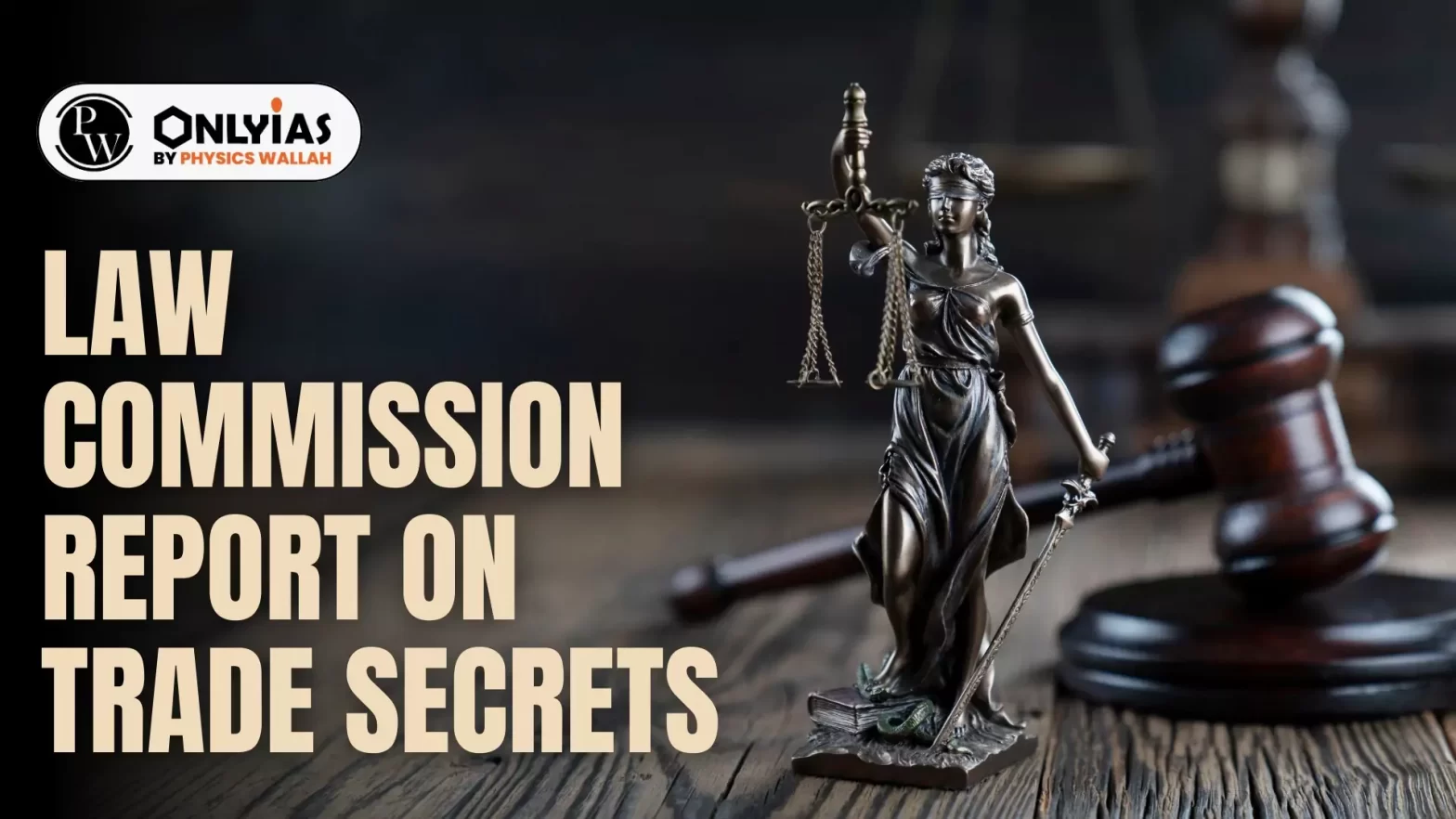Context:
This Article is based on the news “Law Commission recommends new law to protect trade secrets” which was published in the Indian Express. Recently, the Law Commission Of India in its 289th Report ‘Trade Secrets and Economic Espionage’ recommended a new law to protect ‘Trade Secrets’.
Law Commission Report on Trade Secrets: Key Highlights
- Exploring the Unique Dynamics of Safeguarding Trade Secrets within Intellectual Property: Law Commission emphasized their unique characteristics compared to other forms of IP.
| S.NO. |
Patent |
Trade Secret |
| Scope |
Protects new and useful inventions |
Protects any secret information that provides economic value to the business |
| Example |
Alexander Graham Bell’s Telephone 📞 |
Coca-Cola’ secret Formula |
| Duration |
20 Years |
Indefinitely, until the trade secret is leaked (intentionally or accidentally) |
| Rights |
Gives the patent holder the right to exclude others from making, selling, using,importing the invention |
Protects only against misappropriation |
| Territory |
patent rights are territorial, i.e. protection only exists in countries where the patent is granted |
No restricted to territory |
- New legislation be introduced: The Law Commission recommended that new legislation be introduced to protect trade secrets with exceptions relating to whistleblower protection, compulsory licensing, government use, and public interest.
- India’s Obligation towards Trade-Related Aspects of Intellectual Property Rights (TRIPS) Agreement: As per the TRIPS Agreement, it was mandatory for all the member states to protect the Trade Secrets/undisclosed information in accordance with Article 39 of the TRIPS Agreement.
- Single statute relating to trade secrets and economic espionage like the UK, USA, EU, and Germany: to address all issues related to trade secret leakages and economic espionage as consistently targeted by foreign governments in acts of active and passive economic espionage.
- Proposed: The Protection Of Trade Secrets bill,2024 has been proposed by the Law Commission.
Law Commission of India
- It is a non-statutory, executive body of the Govt of India.
- Aim: To work for legal reforms.
- Historical Background: The colonial body was established in 1834.
- 22nd Law Commission headed by Justice (retd) Ritu Raj Awasthi
|
What Are Trade Secrets?
- According to the World Intellectual Property Organization (WIPO), trade secrets are ‘intellectual property rights on confidential information such as formulas, processes, methods, customer lists, and technicality etc which may be sold or licensed’.
Intellectual Property Rights Policy Management (IPRPM) framework
- Types of Intellectual Property Rights Covered under IPRPM Framework:
- (i) Patents, (ii) Trade mark, (iii) Industrial Designs, (iv)Copyrights, (v) Geographical Indications, (vi) Semiconductor Integrated Circuit Layout Design, (vii) Trade Secret, and (viii) Plant Varieties.
- The framework was launched in the form of National IPR Policy 2016 encompassing all IPRs into a single vision document setting in place an institutional mechanism for implementation, monitoring and review of IP laws.
|
- Essentials of a Trade Secret:
-
- Secret: It is known by a limited group of people.
- Commercial Value: Derive their value from being kept secret.
- Reasonable steps to be taken by the owner to keep the information secret.
- Ex – Recipe of Coca-Cola beverages etc.
- Unlike other forms of intellectual property, which are limited in duration, They can be protected indefinitely.
What Are the Issues With Trade Secrets & Espionage laws in India?
- No specific law: Currently, India lacks a specific law for the protection of trade secrets. It is based on equity and common law. Instead, they are safeguarded under the general laws governing contracts, common law, criminal law, and principles of breach of confidence and equity.
- Variation in law to its Application: The legal landscape surrounding trade secrets in India has evolved through case laws leading to variations and inconsistencies in its application.
- In Economic espionage: It typically involves a foreign State as a party, whereas commercial espionage is between two commercial entities.
How is Trade Secret Law Governed in India?
Trade Secret law in India is mostly governed via common law such as:
- Section 27 of the Contract Act – Law that bound the parties not to disclose information contrary to the terms of the contract between the parties i.e., NonDisclosure Agreements.
- Section 405-409 of the Indian Penal Code, 1860 deals with the cases when there is a Criminal Breach of trust.
How Can a Trade Secret Be Protected?
- Non-disclosure agreement (NDA): employees and business partners should sign a non-disclosure agreement that prevents them from disclosing a company’s confidential information.
- Non-compete agreement (NCA): employers should ask employees, contractors and consultants to sign a non-compete agreement to prevent them from entering in competition when their employment/service agreement ends.
What Are the Current Progress in Trade Secret Protection Laws in India?
The Department of Legal Affairs and the Legislative Department examined the issue of enacting the Economic Espionage Act and Trade Secrets Protection Act and prepared a concept paper along with a draft cabinet note and a draft Bill.
Also Read: Law Commission Report On Criminal Defamation
![]() 7 Mar 2024
7 Mar 2024
